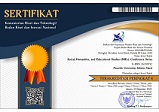The Implementation of Ecological Literacy Learning for Students of Elementary School
Abstract
This research aims to describe the implementation of ecological literacy learning for students of elementary school. The research approach applied is mixed method. In this case, the data collection techniques used are observation, interviews, questionnaires, and documentation. Data analysis was carried out by applying a descriptive qualitative interactive model approach by Miles and Huberman in which the steps are data collection, data condensation, data display, and conclusion. The results of research relating to students' knowledge and attitudes regarding ecological literacy show that the level of students' ecological literacy is lacking. If we look at the ecological literacy indicators, we get different averages, namely ecological knowledge of 8.71% (sufficient criteria), cognitive ability of 3.24% (poor criteria), environmental awareness attitude of 89.11% (good criteria), and environmentally responsible behavior of 75.33% (good criteria). Factors that influence students' implementation of ecological literacy learning are students' lack of knowledge and attitudes about ecological literacy. Students who have good ecological literacy will behave responsibly towards the environment through knowledge, skills and awareness of environmental problems so that ecological literacy plays a role in building character to care about the environment. Students' ecological literacy learning is carried out through several series of activities, namely providing space for students to improve their knowledge and attitudes about ecological literacy as well as real activities.
Keywords
Ecological literacy, ecological literacy learning, elementary school
Full Text:
PDFRefbacks
- There are currently no refbacks.





